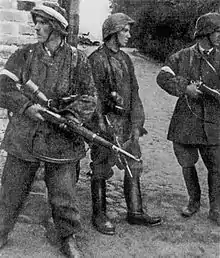Special Courts
Special Courts (Polish Sądy Specjalne) were World War II underground courts in occupied Poland, organized by the Polish Government-in-Exile. The courts determined punishments for citizens of Poland who were subject to Polish law before the war.
- This is an article on the Polish special courts during World War II. For information on the infamous Nazi special courts during the same period see: Sondergerichte. For information on the legal concept of a court with limited jurisdiction, see Special court.
| Part of a series on the |
Underground State |
|---|
 |
History
After the Polish Defense War of 1939, the German authorities of the General Government mobilized all the pre-war Polish policemen to the German service. The so-called Navy-Blue Police (Policja granatowa, nicknamed after the color of their uniforms) were used as an auxiliary unit of the Gestapo and Kripo, yet they had no means of executing law and order in the occupied country. At the same time, the German police forces and courts were more interested in persecution of Jews and members of the Polish intelligentsia and underground rather than common criminals.
First underground, ad hoc courts were created alongside some of the first Polish resistance organizations as early as in 1939.[1] At first, they were purely military, concerned only with the cases that would fall under military law (such as treason).[1] On April 16, 1940, the Polish Government in Exile in London decided that the underground Polish courts be created for prosecution of criminals, traitors, informants and collaborators.[1] The structure and law regulating those courts were mostly finalized around 1942.[1]
The Special Courts tried only the pre-war citizens of Poland who were legally subjects of the Polish law. No citizens of other states (including members of the occupying forces of Germany and the USSR) were ever sentenced by the Special Courts. However, at times such claims were made by the Bureau of Information and Propaganda for propaganda reasons; nevertheless, executions of members of the SS and Gestapo were treated as elements of partisan warfare. The reason for such a policy was a belief that the Polish Underground State should act as if the occupation and dismemberment of Poland never happened.
Polish special underground courts reviewed about 10,000[2] to 17,000[3] cases of collaboration, and sentenced over 3,500 individuals to death[2] (2,500 executions were carried out;[2] many others were sentenced to punishments like beatings or fines, or with a recommendation for review of the case after the war[1]).
Approximately 30% of the executions in Warsaw where on Poles found to blackmail or denounce the hiding Jews (szmalcowniks).[4]
Debate
There is an ongoing debate whether the World War II Polish Special Courts were lawful and obeyed the elementary laws. According to the historians working for the Institute of National Remembrance the courts fulfilled the five basic conditions:
- The courts operated in the name of the Polish State and were subject to both pre-war Polish law and the wartime legislation.
- The courts penalized mostly the misdeeds included in the pre-war Polish law. Most of the trials were related either to high treason or collaboration.
- There are no sources that would claim that the Special Courts sentenced anyone without sufficient evidence of guilt.
- The Special Courts were always trying to reach the lawful verdict. 40% of all the judicial procedures ended up with the defendants found not guilty. Only 25% of the verdicts were for capital punishment, while the rest included the lash, infamy, banishment or fines. In many cases, the prosecution was suspended until the final liberation.
- All of the procedures of the Polish law were obeyed. The only exception to that rule was the case of the so-called preemptive liquidation, when a person known for being a German spy or collaborator had to be executed before he could denounce the resistance network.
However, some German historians claim that after 1939 Poland did not exist, and the execution of Polish law on German-held territory was therefore against international law. These claims remain controversial, since the annexation of Poland in 1939 was unilateral and acknowledged only by the Axis Powers and the USSR (which later declared its pact with Germany null and void). Moreover, the invasion was itself in violation of international law (German officials were later prosecuted at the Nuremberg Trials for it), being an act of aggression (despite a German false flag attack that sought to show Polish provocation).
Notes
- Stanisław Salmonowicz, Polskie Państwo Podziemne, Wydawnictwa Szkolne i Pedagogiczne, Warszawa, 1994, ISBN 83-02-05500-X
- Friedrich, Klaus-Peter (Winter 2005). "Collaboration in a 'Land without a Quisling': Patterns of Cooperation with the Nazi German Occupation Regime in Poland during World War II". Slavic Review. 64 (4): 711–746. doi:10.2307/3649910. JSTOR 3649910.
- Connelly, John (2005). "Why the Poles Collaborated so Little: And Why That Is No Reason for Nationalist Hubris". Slavic Review. 64 (4): 771–781. doi:10.2307/3649912. JSTOR 3649912.
- Joshua D. Zimmerman (5 June 2015). The Polish Underground and the Jews, 1939–1945. Cambridge University Press. pp. 414–415. ISBN 978-1-107-01426-8.
Further reading
- Leszek Gondek, Polska karząca, Warszawa, 1988
